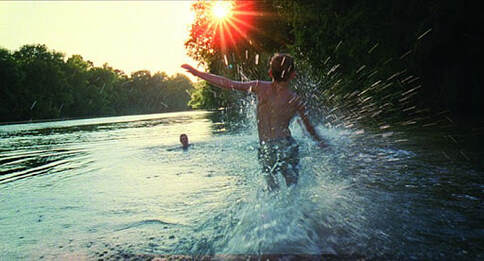The most memorable and ecstatic part of Tree of Life is the long period spent in Waco, but it wouldn’t be as powerful without the knowledge of the tragedy that hangs over it and moreso without another long sequence that only Malick would think to include. Mr. O’Brien learns of his son’s death while he’s at work at an airfield, made to look tiny against a gigantic jetliner. Adult Jack is made to also look small against glass windows and skyscrapers, with the added motif of both hearing and seeing waves crashing endlessly into the coast. This might be enough to emphasize the smallness of the characters against the larger world, but Malick makes them smaller still, imagining their troubles against the vastness of space and time. Mrs. O’Brien’s voice calls out over red gas radiating over black nothingness, asking god if he knew that her son would die even at this early stage. This segment recognizes modern humanity’s singular dilemma of recognizing their meaninglessness but still having to find meaning in their lives, that they exist on accident and act with purpose. Malick frames it through religion but god is only a word on the lips and thoughts of his characters, an unnecessary addition to these breathtaking representations of early cosmology.
This continues through the quieting of earth’s geyser and volcano-ridden landscape, towards the formation of life into larger and larger organisms. Some of the earliest dialogue in the film is a Mrs. O’Brien’s assertion that one can follow a state of nature or a state of grace, defined in the film as unsatisfied rapaciousness versus contentment and peace. The cell versus cell battle of the primordial soup could only be defined as the former, with larger cells consuming smaller ones in a wild orgy of membranes and tendrils. The emergence of beauty comes in jellyfish swimming through kelp forests, and the symmetry of the inorganic and organic world is mirrored in river systems and vascular systems that feed fetal dinosaurs. A potentially ludicrous scene plays out between two dinosaurs in a riverbed, where a predator perhaps becomes the first to enter a state of grace when it contemplates killing a helpless prey dino and thinks better of it. All this can be imagined as ricocheting off the wrong viewer, but Tree of Life entrances and hypnotizes the viewer that can get on its wavelength. Malick’s collaboration with cinematographer Emmanuel Lubezki and composer Alexandre Desplat does a lot of the work here, as image is matched with score in a way that buffets the viewer along for almost an hour before anything approaching a plot with characters has really emerged.

It wouldn’t be a Malick film without a hefty dose of portentous voiceover, and McCracken’s Jack does most of it in the Waco sections. Jack’s thoughts are turned over to a reconciliation of a giving and just god who allows one peer to drown in the swimming hole and another to be badly burned in a house fire. His god exists somewhere in the clouds, perhaps sending a butterfly to rest calmly on his mother’s hand, but a more earthbound version lives in his house. The same unjust provider that Jack judges god to be dominates his dinner table and makes him call him ‘sir.’ Pitt’s Mr. O’Brien is the expected 50’s dad, running his house like a cold tyrant, but he puts on that hat because he feels it’s expected of him. He rules without putting his heart into it, giving his sons conflicting demonstrations of love and obedience by extracting goodnight kisses from them. His kids, especially Jack, develop a deep well of hatred towards him, but they also remember seeing him turn himself over to his passionate love of music that he’s had to sublimate to make reliable money for his family. Representing the way of nature, Mr. O’Brien has to put away romantic hopes or pursuits for force of will and ruthlessness if he wants to thrive in the world.
Mrs. O’Brien stands in sharp contrast. She’s one of Malick’s frolicking female characters who, if presented with a field of tall grass, would spin and skip through it without a care in the world, but again, there’s more there than what’s expected. She’s also a fierce defender of her sons from her husband. When the boys do something kind for a friend or a neighbor, it’s never in doubt that they’re doing it because of her influence. So many of the perfect moments of Tree of Life are derived from her sons demonstrating within their preadolescent world what a state of grace looks like. She is idolized by the film, but the scenes in Waco take place through her children’s eyes and therefore the idolization makes perfect sense. Mr. O’Brien is the disciplinarian and the enforcer, while Mrs. O’Brien is the inspirer and the doter. By including one party’s regret and remorse, Malick makes clear which parenting strategy he subscribes to.
The Tree of Life is nakedly obsessed with its characters’ personal relationship with god, and it manifests in every relationship to power. The parental relationships are most apparent in the contrast between a demanding and a loving deity, and what lessons the subject is going to take from either method. Mr. O’Brien is subject to his own hierarchy at work, and the glances the viewer gets of it is of an impassive behemoth that makes life-altering decisions on a whim with no thought to years of service or quality of work. The boys find their own domination systems, whether it’s bigger and older kids against smaller and younger ones, or against rodents and small animals. For a dyed-in-the-wool, not spiritual nor religious atheist, it’s increasingly easy to be unmoved by characters having a theological crisis, as the answer is right in front of them. Here, the search for a relationship with something greater boils down not to an epiphany or a road-to-Damascus moment but to a decision of what kind of person they’re going to be, of how they’re going to act when they can exercise power. There’s a sense of lifelong project in that journey, which prevents Tree of Life from feeling pat or like it’s pretending that a revelation happened upon in childhood would stick. It allows for the possibility that no relationship with god is a fine choice, while also allowing for the possibility of nonexistence and all this searching is just self-flagellation passed through generations.
The Tree of Life asks the viewer to do some work, and is therefore not for everyone. If one is too resistant to the whispered voiceover or baffled by the candlelight motif that keeps returning, this is a film that will keep a person at a distance. Bridge that distance and there’s an endlessly thoughtful and enjoyable experience, to say nothing of the considerable artistic one as well. Malick asks the biggest of questions while putting the personal onscreen, happily marrying both by being earnest in the max. This is a film without a trace of cynicism or sarcasm, a film about tiny baby feet and DDT clouds and dinosaur mercy all in one. Even the Sean Penn scenes, which I earlier thought out of place, worked for me this time. The Tree of Life gets better every time, growing more profound and transporting with each new watch. A

 RSS Feed
RSS Feed